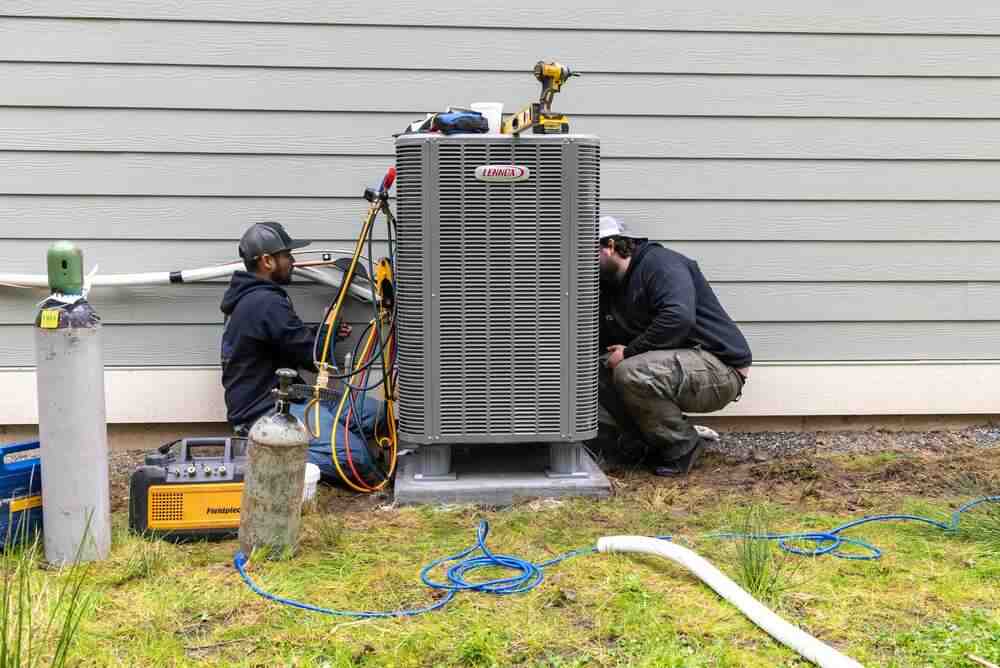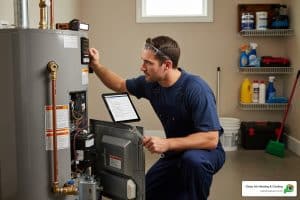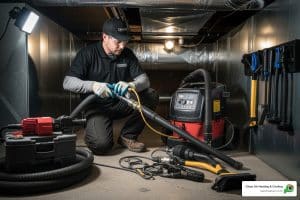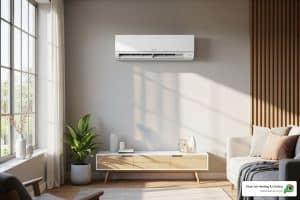Why Your HVAC System Needs an Annual Check-Up
HVAC annual service is a comprehensive inspection, cleaning, and tune-up by a licensed technician to ensure your heating and cooling system runs efficiently and safely. Here’s a quick overview:
- What it includes: Filter replacement, coil cleaning, refrigerant checks, electrical connection inspection, safety control testing, and component lubrication.
- Recommended frequency: At least once per year (twice for heat pumps or systems in extreme climates).
- Key benefits: 10-30% lower energy bills, extended system lifespan, fewer breakdowns, improved air quality, and maintained warranty coverage.
- Typical duration: 60-90 minutes.
- Best timing: Spring for AC units, fall for furnaces.
Your HVAC system is the heart of your home’s comfort, but it’s easy to neglect it until something goes wrong. Like a car, your heating and cooling equipment requires professional attention to run efficiently. Skipping annual service can lead to higher energy bills, unexpected breakdowns, and costly emergency repairs averaging between $150 and $500. More importantly, neglected systems can pose safety risks like carbon monoxide leaks or poor indoor air quality.
According to the U.S. Department of Energy, regular maintenance can improve your system’s efficiency by up to 30%, and the National Association of Realtors notes that well-maintained systems can add 10% to 20% to your home’s value.
I’m Colin Matei, Owner of Clean Air Heating & Cooling. I’ve seen how critical HVAC annual service is for homeowners in Whatcom and Skagit counties. This guide will break down what’s included in a service, its benefits, and why it’s essential for your home’s comfort and safety.
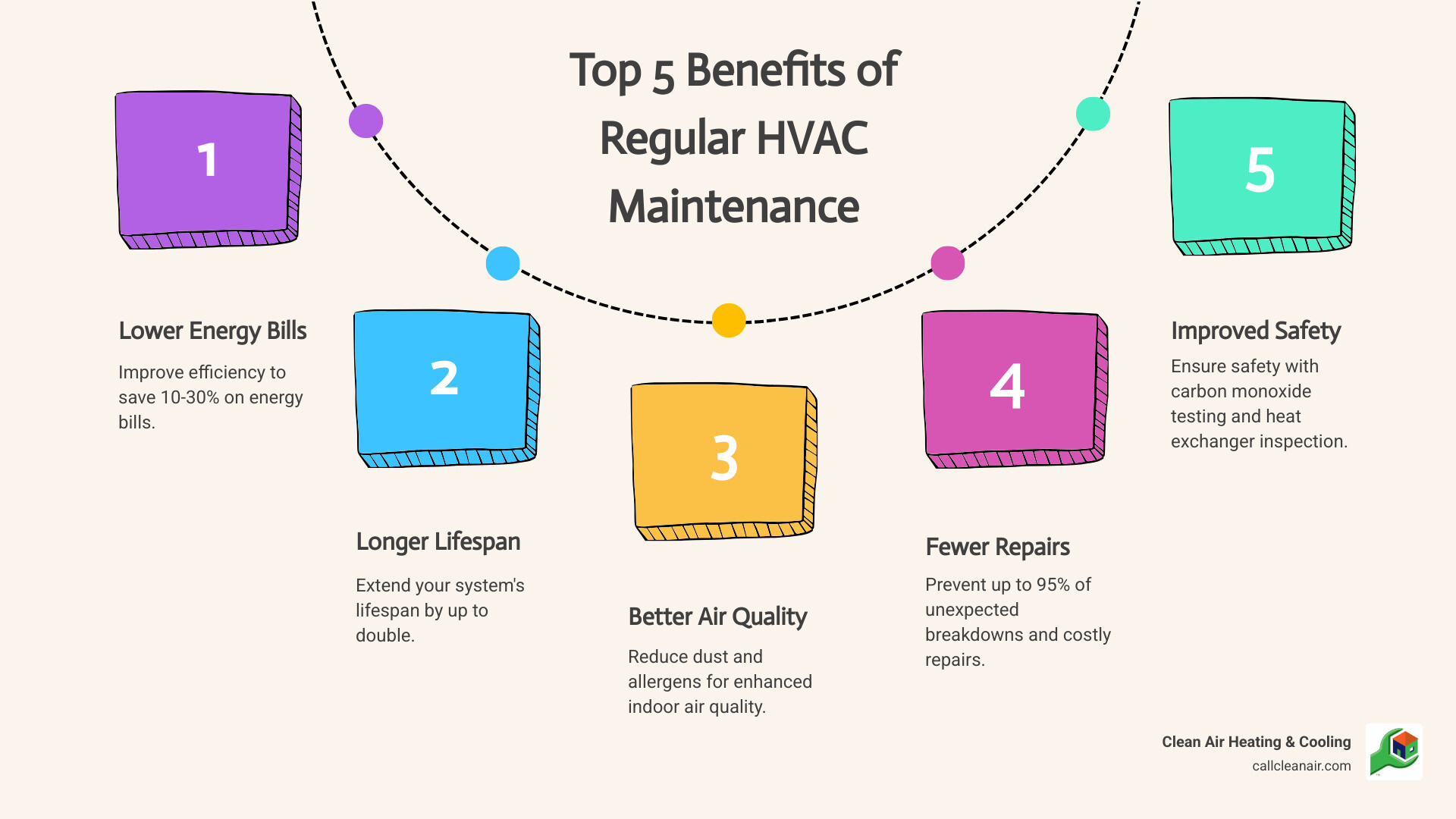
The Big Payoff: Key Benefits of Regular HVAC Maintenance
Regular maintenance is an investment that protects your comfort, safety, and budget. Just as a car needs oil changes, your HVAC system requires professional care to prevent failures and provide peace of mind. The benefits are significant, as countless homeowners in Bellingham and across Northwest Washington have finded.
Energy efficiency and lower utility bills are often the first benefits customers notice. A clean, well-tuned system doesn’t have to work as hard, using less energy to keep your home comfortable. The savings can be substantial—anywhere from 10% to 30% on your energy bills. For more ways to reduce costs, see our HVAC Energy Saving Tips.
Regular maintenance also extends your system’s life. A well-maintained system can last up to twice as long as a neglected one—potentially 15-20 years instead of just 7-10. By catching small issues like a worn belt or loose connection early, we prevent them from causing major failures that could require a premature replacement.
Emergency service calls are stressful and expensive. During an HVAC annual service, our technicians spot potential problems before they become emergencies. This proactive approach means catching small issues today to avoid big problems tomorrow. Learn more about the Benefits of Regular HVAC Maintenance on our dedicated page.
Your HVAC system also controls your home’s air quality. Over time, dust, allergens, and dander accumulate in the system. During maintenance, we clean these components and check your filters, resulting in cleaner, healthier air. This is especially beneficial for families with allergies, asthma, or pets.
Here are a few more key advantages:
- Increased Home Value: The National Association of Realtors reports that a well-maintained HVAC system can add 10% to 20% to your home’s value.
- Warranty Protection: Most HVAC manufacturers require proof of annual professional maintenance to keep your warranty valid. Skipping check-ups could leave you paying the full cost for a covered repair.
- Improved Safety: For gas furnaces, annual service is critical. Our technicians inspect the heat exchanger for cracks, test for carbon monoxide leaks, and verify all safety controls are working. This peace of mind is invaluable.
A Look Under the Hood: What’s Included in an HVAC Annual Service
A professional tune-up is a comprehensive inspection covering every critical component of your system. Our technicians follow a detailed checklist to inspect, clean, and adjust dozens of parts, ensuring your system operates at peak performance. While specifics vary by system type, the core tasks always address three priorities: safety, efficiency, and longevity. Our HVAC Maintenance Checklist guides our approach so nothing is overlooked.
During a typical HVAC annual service, we start by checking safety controls like limit switches and flame sensors. We then tighten electrical connections, which can become a fire hazard if loose, and verify your thermostat is properly calibrated to prevent the system from working overtime. Lubricating moving parts like motors and bearings reduces friction and prevents premature wear. We also inspect the condensate drain line to prevent water leaks and mold growth, check your air filter, and run a complete system operation test to ensure everything is working correctly.
What to Expect During an AC HVAC Annual Service
An AC tune-up prepares your system for summer by focusing on the components that remove heat and humidity. We give the outdoor condenser coils and indoor evaporator coil a thorough cleaning to restore efficiency. We also check that refrigerant levels are correct for proper cooling and test capacitors that help start the motors. The blower motor is inspected to ensure it’s moving air efficiently through your ductwork. If you need professional Air Conditioning Service Bellingham WA, our team has you covered.
A comprehensive AC inspection includes over 20 checks. Key tasks involve cleaning the outdoor condenser and indoor evaporator coils, checking refrigerant levels, testing capacitors, and clearing the condensate drain line. The technician will also inspect the blower motor, tighten electrical connections, measure airflow and temperature differential, and test all safety controls to confirm the system operates at peak performance.
Key Tasks in a Furnace HVAC Annual Service
Before winter, a furnace tune-up focuses on safety and reliability. The most critical step is inspecting the heat exchanger for cracks that could leak dangerous carbon monoxide. We also test for carbon monoxide with specialized equipment. We clean the burners for efficient combustion, check the ignition system for reliability, and inspect the flue piping to ensure byproducts are vented safely. We follow our detailed Furnace Maintenance Checklist to ensure nothing is missed. For reliable Heating System Installation Bellingham WA, our experienced team is here to help.
Special Considerations for Heat Pumps
Heat pumps provide both heating and cooling, meaning they run year-round and benefit from semi-annual service—once before cooling season and once before heating season. During service, we pay special attention to the reversing valve, which switches the system between heating and cooling modes. We also test the defrost cycle to prevent ice buildup on the outdoor coil in colder weather. Verifying the refrigerant charge and cleaning blower components are also critical for these versatile systems. Learn more about The Importance of Regular Heat Pump Maintenance and how it keeps them running smoothly.
Timing, Costs, and DIY: Planning Your Maintenance
Understanding when to schedule service, what it costs, and what you can do yourself helps you manage your home’s comfort system. The ideal frequency depends on your system type, local climate, and household factors.
For standard furnaces and air conditioners in moderate climates like ours in Bellingham, an annual service is sufficient—ACs in spring, furnaces in fall. However, heat pumps run year-round and benefit from semi-annual service (spring and fall) to address constant use.
More frequent checks may be needed for older systems, homes with pets or allergies, or systems that run almost continuously. Our local climate in Whatcom and Skagit Counties can also affect your system, with dust or humidity leading to faster grime buildup. Our Your HVAC Maintenance Guide: Seasonal Checklists can help you plan. For more on service frequency, this Essential Guide: How Often Should You Get Your HVAC Serviced? offers helpful insights.
Can I Do Any HVAC Maintenance Myself?
While most tasks require a licensed professional, homeowners can perform a few simple jobs to help maintain system efficiency between tune-ups. Think of it as the difference between brushing your teeth daily and visiting the dentist—both are important.
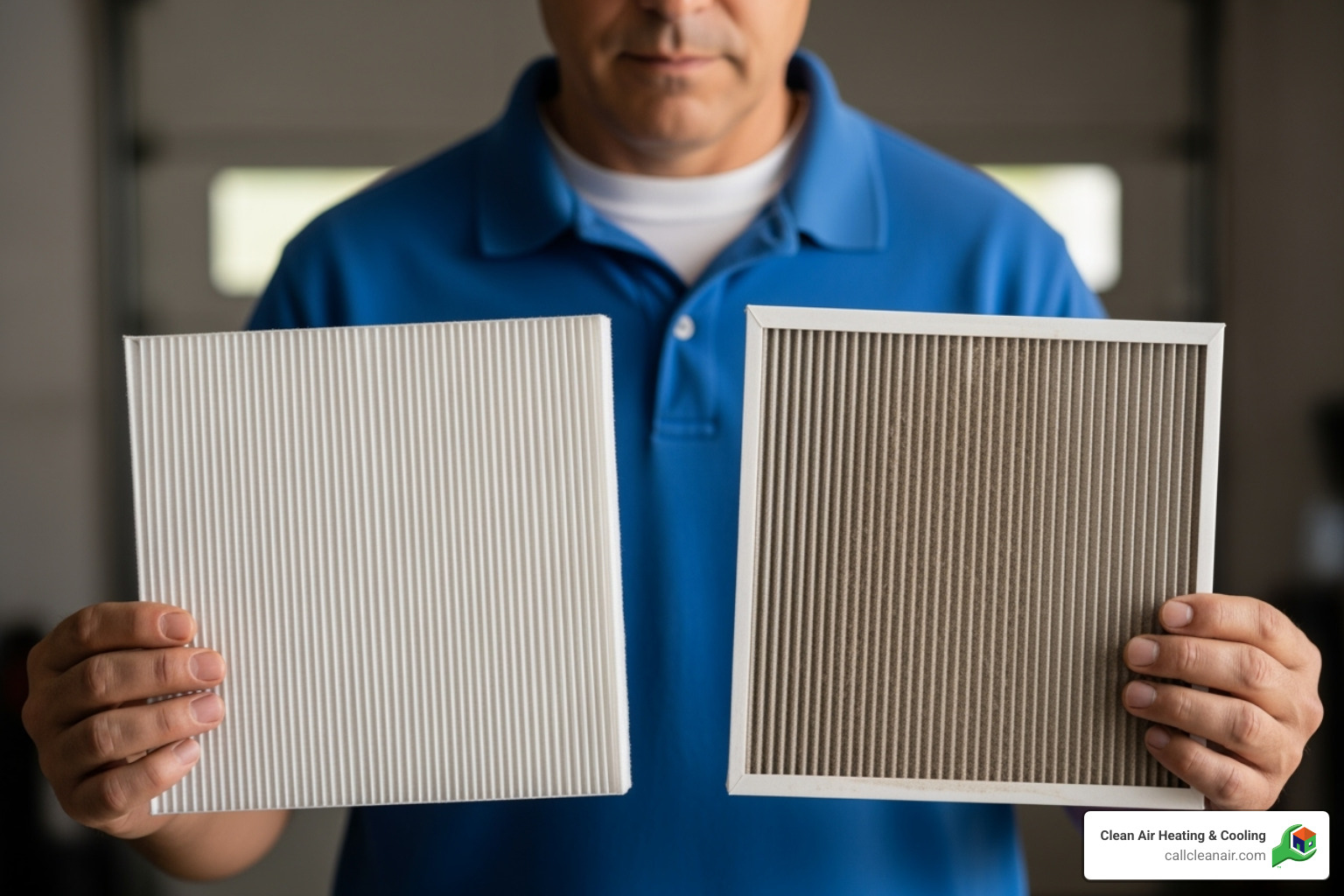
- Change your air filters: This is the most important DIY task. Change or clean your filter every 1-3 months (more often if you have pets or allergies). A clogged filter restricts airflow and forces your system to work harder.
- Keep the outdoor unit clear: Your outdoor AC or heat pump needs room to breathe. Clear away leaves, grass clippings, and other debris that can block airflow.
- Clean vents and registers: Regularly vacuum or wipe down your indoor vents to remove dust buildup, which can impede airflow.
- Check thermostat batteries: If your thermostat is battery-powered, replace the batteries annually to avoid unexpected outages.
These tasks supplement professional HVAC annual service, not replace it. For complex inspections, refrigerant checks, or electrical work, always call a professional. Your safety depends on it. For more guidance, visit our HVAC Safety Tips page.
Understanding Service Costs and Maintenance Plans
The cost of an HVAC annual service is almost always less than an emergency repair, which can average between $150 and $500. Many homeowners in our service areas opt for a maintenance plan for added value and peace of mind.
The benefits of a maintenance plan often go beyond the scheduled service. Members typically receive priority scheduling, which is invaluable during peak seasons. Many plans also offer discounts on parts and labor for any needed repairs, and diagnostic fees are often reduced or waived. Plus, we’ll remind you when it’s time for your service, so you don’t have to remember to schedule it yourself.
Investing in a maintenance plan is a smart way to protect your comfort and budget. When choosing a provider, be sure to screen the company to ensure you’re getting reliable, professional service. We invite you to explore our comprehensive HVAC Maintenance Plans to find the right fit for your home.
Warning Signs: When to Call a Pro Immediately
Your HVAC system usually gives you warning signs before it fails. While HVAC annual service is crucial for prevention, these red flags mean you need professional attention right away. Ignoring them can turn a simple fix into a major repair bill.
Strange noises are a common first alert. While a gentle hum is normal, sounds like banging, grinding, or squealing indicate a problem. These noises can point to loose parts or a failing motor, which can cause further damage if ignored.
Unusual smells should never be ignored. A burning odor could signal an electrical issue, while a musty smell often points to mold or mildew. If you smell rotten eggs, it could indicate a gas leak—evacuate your home, call emergency services, and then call us.
Weak airflow from your vents means your system is working overtime. This could be caused by a clogged filter, leaky ductwork, or a failing blower motor. It drives up energy bills and reduces comfort.
Frequent cycling (when the system turns on and off too often) puts tremendous stress on components. This “short cycling” wears out parts faster and can be caused by an oversized system, a failing thermostat, or a clogged filter.
Higher energy bills without a change in usage are a strong indicator of an efficiency problem. If your bill suddenly spikes, your HVAC system is likely struggling and costing you money every day.
Water leaks around your indoor or outdoor unit are never normal. Puddles can signal a clogged condensate drain line or a cracked drain pan. Address leaks promptly to avoid water damage to your home.
Inconsistent temperatures are a symptom of a struggling system. If some rooms are too hot while others are too cold, your system isn’t distributing air properly, possibly due to ductwork issues or a failing blower.
These signs mean your system needs help now. Catching them early can be the difference between a simple repair and a full replacement. For more details, check our Signs My HVAC System Needs Repair page.
Frequently Asked Questions about HVAC Service
We often get questions from homeowners throughout Northwest Washington about HVAC annual service. Here are the answers to the questions we hear most often:
How long does an HVAC annual service take?
A thorough HVAC annual service typically takes 60 to 90 minutes. The exact time depends on your system type and its age. An older or long-neglected system might require more time. Our goal is a careful inspection, not a rushed job, to ensure your system runs efficiently and safely.
Is annual HVAC maintenance really worth it?
Absolutely. The cost of annual service is minimal compared to an expensive emergency repair or premature system replacement. Regular maintenance saves you 10% to 30% on energy bills, can extend your system’s lifespan by up to double, and prevents up to 95% of unexpected repairs. Emergency repairs average between $150 and $500, while a new system costs thousands. Annual maintenance is a smart investment that pays for itself.
Does my new HVAC system still need maintenance?
Yes. Most manufacturers require proof of annual maintenance to keep your warranty valid. If a covered part fails and you can’t show a service history, you could be responsible for the full repair cost. Additionally, servicing a new system ensures it operates at peak efficiency from the start and allows us to establish a performance baseline, making it easier to spot future issues. Think of it like the required oil changes for a new car—it protects your investment.
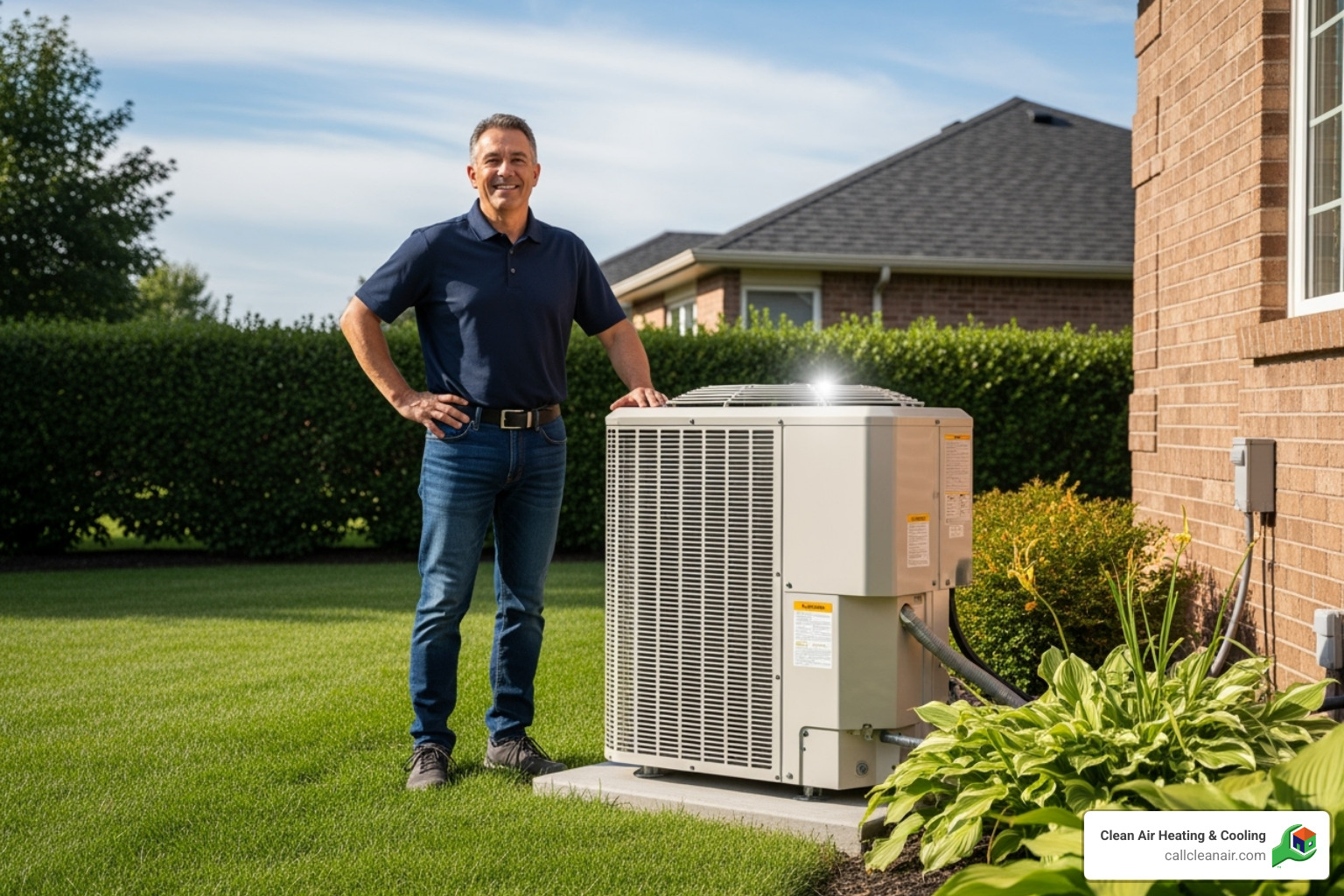
Conclusion: Secure Your Comfort for the Year Ahead
An HVAC annual service is your home’s insurance policy against discomfort, unexpected expenses, and safety hazards. It’s a proactive step that ensures lower energy bills, fewer emergency repairs, and cleaner, safer air for your family.
Throughout this guide, we’ve shown how a 60 to 90-minute tune-up can save you 10% to 30% on utility bills, extend your system’s lifespan, and prevent costly breakdowns. From cleaning coils and checking refrigerant to testing for carbon monoxide, these steps are essential for keeping your home comfortable through every season.
The team at Clean Air Heating & Cooling helps families throughout Whatcom, Skagit, Snohomish, San Juan, and Island Counties maintain their home comfort systems. We’ve seen how regular maintenance prevents the furnace failures and AC breakdowns that nobody wants. Our professional technicians understand the climate challenges of Bellingham, WA, and are committed to delivering the 5-star service our 480+ reviews reflect.
Don’t wait for strange noises or high energy bills to force your hand. The most comfortable homes are the ones where maintenance happens before problems arise. Now is the perfect time to take action, whether you’re protecting a new system’s warranty or extending the life of an older unit.
Ready to secure your comfort for the year ahead? Explore our comprehensive HVAC Maintenance Plans and find how simple it is to keep your home running smoothly, efficiently, and safely—all year long. Give your system the care it deserves.

